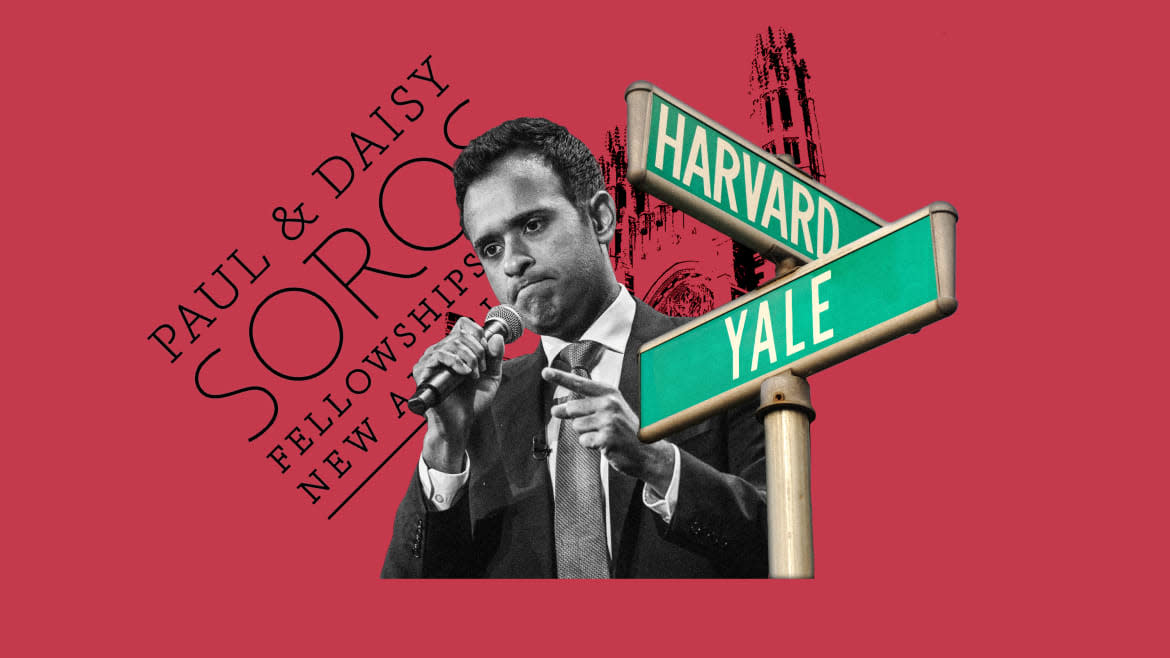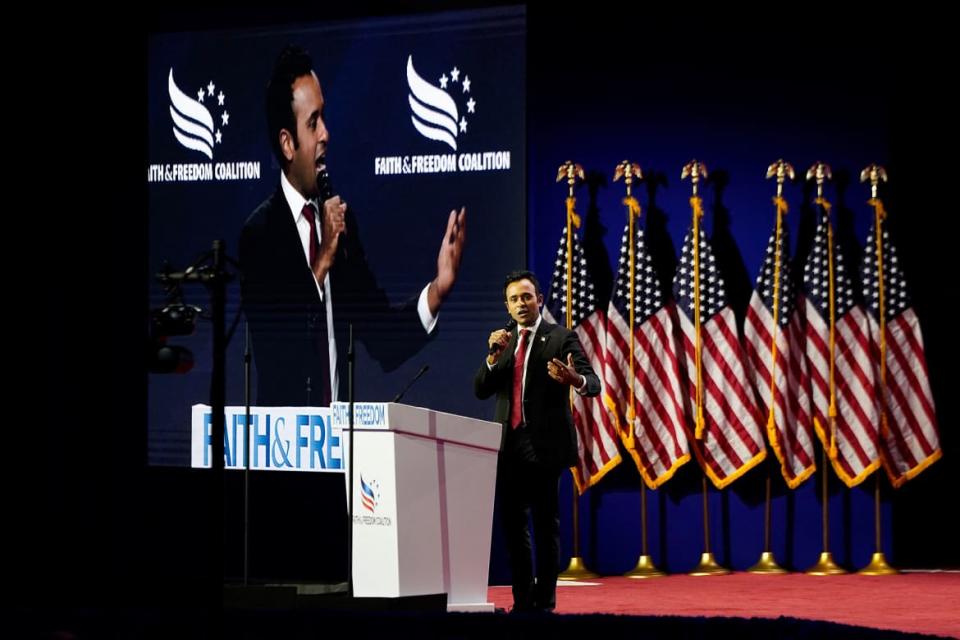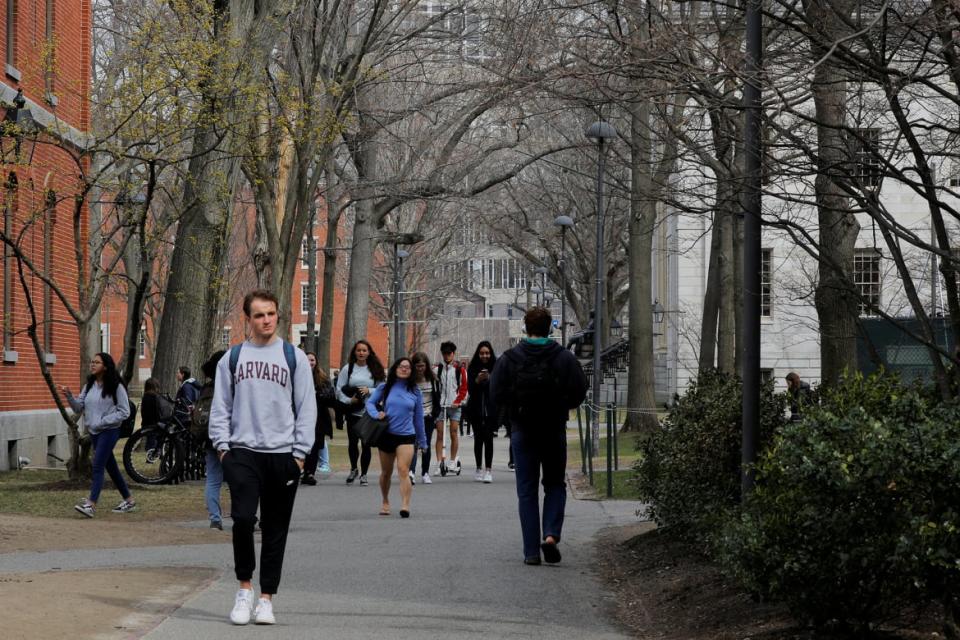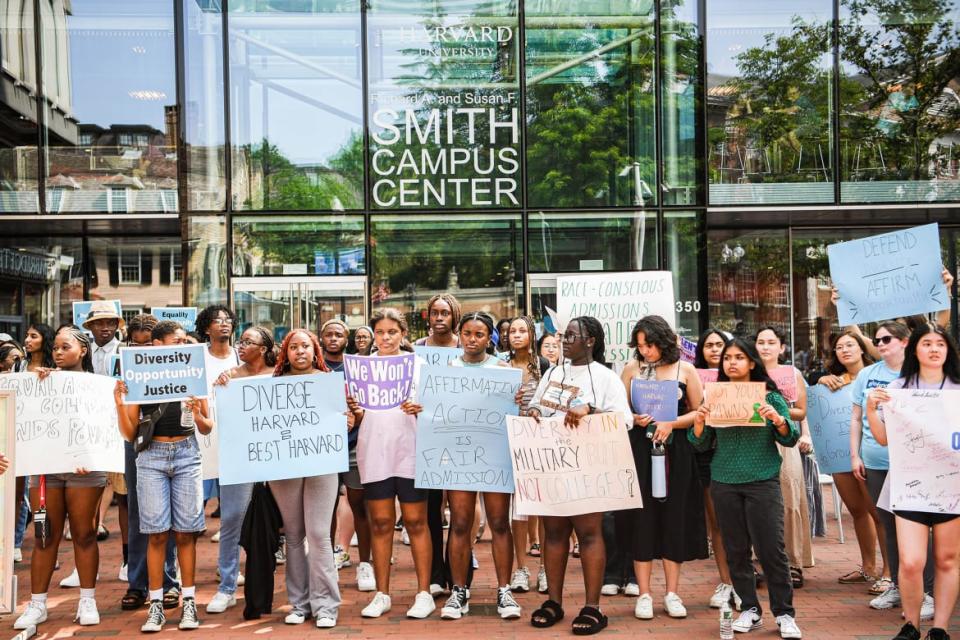‘Anti-Woke’ GOP Candidate Vivek Ramaswamy Can Thank Affirmative Action for His Success

- Oops!Something went wrong.Please try again later.
Thirty-seven-year-old Republican presidential candidate Vivek Ramaswamy has made his strident opposition to affirmative action a main part of his campaign pitch. (His other major policy pillar is fighting “wokeness.”)
Since announcing his presidential run in February, Ramaswamy has railed against what he refers to as “preferences”—race, gender, legacy status, etc.—in college admissions and in hiring, saying entrance into both areas should be based on “pure merit.”
He has called race-based admissions “a cancer on our national soul,” promised that as president he would end race-conscious college admissions “on Day One without apology,” and identified the defeat of affirmative action as the “tip of the spear of my policy agenda.”
Vivek Ramaswamy Runs Straight Into the Trump/DeSantis GOP Civil War
Ramaswamy cheered the Supreme Court’s decision to end race-conscious admissions at Harvard, his undergraduate alma mater, despite the school noting that no students are admitted on the basis of race alone.
But as he made his way through two Ivy League universities, Ramawamy himself benefitted from a generous fellowship intended to provide opportunity and equity to groups who have historically often faced systemic barriers to success.
Moreover, that fellowship came by way of the Soros family. (Yes, that would be the family of George Soros—the right wing’s all-purpose boogeyman.)
THE SOROS FELLOW
Few names stir up a fit of pique among the anti-woke like “Soros.” This might be why Ramaswamy doesn’t want his name appearing anywhere near “Soros.”
But that’s proven difficult, because in 2011 Ramaswamy was part of the tiny pool of graduate students who had applied for, and received, the Soros Fellowship for New Americans.
The fellowship—which offers up to $90,000 over two years to students pursuing graduate degrees in multiple disciplines at elite U.S. universities (like Yale Law School, which Ramaswamy attended)—is underwritten by Daisy and Paul Soros, the latter being the late brother of George Soros. It is earmarked solely for “immigrants and children of immigrants to the United States.” Put simply, it’s to help level the playing field for children in identity groups that have historically been left behind.
So embarrassing to the candidate is this significant chapter of his origin story that, according to reporting by Mediate in May, Ramaswamy paid to have information about the fellowship “scrubbed” from his Wikipedia page.
What’s so bad about the fellowship that helped Ramaswamy make his way through elite higher education—and quickly into multi-millionairedom?
As stated on the fellowship’s site: “The program seeks to create ‘a level playing field’ for the consideration of applicants from different backgrounds, in different fields, at different stages in their educational development, and of different ages. Because New Americans and their families have had very different immigration experiences, we take those differences into account in assessing applicants’ success in meeting the selection criteria…
[The] program looks at applicants holistically and has never had a preferred GPA or test score range. The program is interested in applicants who do the most with what they have, challenge themselves, and work hard to overcome obstacles.”
So, it seems that in addition to being highly selective, the Soros Fellowship that Ramaswamy received takes affirmative action to ensure equity for an often marginalized group. It’s the exact sort of program that Ramaswamy’s entire political campaign seems laser-focused on ending.

Republican presidential candidate Vivek Ramaswamy addresses The Faith and Freedom Coalition conference in Washington, DC, on June 23, 2023.
MERITOCRACY?
No one gets a Soros scholarship merely by virtue of being from an immigrant family. The prestigious fund values academic rigor, and eligible applicants—who must be either “green card holders, naturalized citizens, Deferred Action for Childhood Arrival (DACA) recipients,” grad students born elsewhere who graduated from both a U.S. high school and college, or first generation kids of immigrant parents—are highly qualified students who deserve access to opportunities.
RFK Jr.’s Legacy of Inflicting Severe Damage on Black Communities
Like many elite programs and institutions (including the Soros Fellowship), Harvard also evaluates students “holistically,” meaning that while it always demands academic “excellence,” as the university states in court papers, it “does not define excellence through a narrow focus on grades [GPA] and test scores.” (In a post-SCOTUS decision column for the New York Post, Ramaswamy wrote that “meritocracy would be restored” and that “GPAs and SAT scores might even make a comeback!”)
Instead, like the Soros Fellowship, it considers myriad other factors. That includes where the student grew up, socioeconomic status, various “intangible aspects of their character” and, yes, race. As Supreme Court Justice Ketanji Brown Jackson wrote in her dissent, affirmative action helps “level the playing field”—the same goal explicitly expressed by the Soros Fellowship—for students from historically marginalized groups.
When Democratic presidential candidate Robert F. Kennedy Jr. tweeted in favor of affirmative action after the Supreme Court decision, Ramaswamy hopped on Twitter to counter him—specifically citing the number of immigrants it benefits as proof that it should be destroyed.
“The majority of black students at Harvard are not descendants of slaves but descendants of immigrants,” he wrote. “Giving special preferences to someone who *looks like* a person who once suffered is not justice. We should finally embrace colorblind meritocracy in America rather than to repeat our past mistakes.”
Does Ramaswamy see any incongruity in his opposition to the use of preferences such as race, gender or even legacy/ALDC (athletes, legacies, donor offspring, children of faculty and staff) and his acceptance of a fellowship solely given to grad students from immigrant families? In particular, does he not grasp that the fellowship also selects its fellows based on holistic review, which, while requiring stand-out academics, deemphasizes grades/GPA as the sole determinant of “merit,” with the shared intent to create a “level playing field”?
Does he truly believe that race-conscious admissions at elite colleges such as Harvard, which has a tiny 4 percent acceptance rate, are actually permitting students to coast on the basis of race? (The Soros Fellowship has a 1.2 percent acceptance rate.)

Students walk through the Yard at Harvard University.
Does he genuinely believe, as he told ABC News just after the Supreme Court decision came down, that programs that consider things such as race, gender, and—one would have to assume—immigration background, are “putting people into positions that they’re actually not qualified to have?”
Ramasway told NPR in May, “I don’t believe in a backwards-looking, distributive justice-based framework for distributing social goods or services on axes” related to identity—which seems to blow up the idea of any aid that benefits any struggling group, including the Soros Fellowship.
Ramaswamy claims race-conscious policies teach black kids, “You don’t have what it takes to be able to succeed on your own,” that they lead to a “new form of psychological slavery… that keeps you in shackles” and that they cause bigotry, “creating a new wave of anti-black racism.” Does he believe fellowships for children from immigrant families, like the one he got, is to blame for and justifies xenophobia? Does he secretly carry a burden of knowing he couldn’t succeed without identity-based help?
Contrarian Defenses of RFK Jr. Are Not Brave—They’re Boring
I asked Tricia McLaughlin, a senior adviser to Ramaswamy’s campaign, about the conflict between her candidate’s stance on “preferences” and his acceptance of a fellowship Soros based on what he would surely otherwise label an “identity-based” category, that literally and explicitly uses the same determinants he maligned as “the death of merit” when applied in race-conscious admissions?
“I disagree with the premise of your question,” McLaughlin told me, via email. “Vivek is against race-based preferences in hiring and admissions. Immigrants are not defined by a certain skin color or melanin content.”
So, by this logic, when the Black and Hispanic children of immigrants receive the Soros Fellowship, it’s bad and counts as affirmative action and is an example of how the policy is, to again quote Ramaswamy, “putting people into positions that” the candidate, for some reason assumes, “they're actually not qualified to have.” But when Ramaswamy got it, it was cool and a testament to his merit?
It’s an interesting admission from a campaign that claims it’s actually the left who tells Black and Hispanic folks that race “govern[s] who you are and what you can achieve.” But it’s Ramaswamy and his ilk who stand in the way of the “colorblind meritocracy” they falsely purport to want, because it’s actually those same folks who think everything—even the meaning of a fellowship—changes based on the race of the person receiving it.
Ramaswamy apparently opposes preferences for all protected classes (in his own words, he’s against programs that focus on “race or gender or sexual orientation” to distribute benefits)—except for the one that includes him. Cool, cool.
HELP IS A GOOD THING
If anything, Ramaswamy should tout his selection by the Soros Fellowship, because it’s evidence of how important programs that help remove hurdles for underrepresented groups truly are. Like those accepted by Harvard, Soros Fellows have already proved their mettle in plenty of ways—and, in fact, Ramaswamy had already been his high school’s class valedictorian, graduated Harvard College summa cum laude with a degree in biology, and was a member of Phi Beta Kappa before he was selected.
Did having perhaps as much as $90,000 in scholarship funds to attend pricey Yale Law likely widen his field of options?
Did it help so much that during his “years in law school,” his time working at a biotech investment firm “ended up being some of my most successful years as an investor,” as he said on the Harvard podcast?
Did it allow him to earn capital that, upon graduating, then further allowed him to found the biotech company Roivant Sciences in 2014, which catapulted his career into the stratosphere?
This Juneteenth, Remember the GOP Is the Neo-Confederate Party
Ramaswamy has emphasized that he “didn’t grow up with money.” I think any logical person would say yes, the money—in tandem with Ramaswamy’s drive, pluck, and smarts—likely had some beneficial impact.
And that’s a good thing.
Ramaswamy and other opponents of affirmative action and various programs aimed at expanding opportunities for certain groups often present the world as a zero-sum game, in which someone else’s gain must be your loss—by theft. (“A benefit provided to some applicants but not to others necessarily advantages the former group at the expense of the latter,” Chief Justice John Roberts wrote in the SCOTUS decision killing affirmative action.)
It’s a disingenuous argument from someone who should (and very likely secretly does) know better, firsthand.

Participants at a rally protesting the Supreme Court's ruling against affirmative action on Harvard University Campus in Cambridge, Massachusetts on July 1, 2023.
REWRITING HISTORY
According to Mediate’s reporting, Ramaswamy paid to have information about the fellowship “scrubbed” from his Wikipedia page. The report pointed to the public-facing page of an editor screen-named “Jhofferman,” who indicated “they had been paid by Vivek Ramaswamy for their contributions to Wikipedia.”
A page detailing edits Jhofferman made to Ramaswamy’s biography indicates the editor “Deleted extraneous material re fellowship” on Feb. 9, 2023. Wiki users and editors debated the ethics of the deletions (with one writing that the removal of the fellowship information “calls into question the reliability of the entire article”) and reinserted a sentence about it.
McLaughlin, the Ramaswamy campaign adviser, told me there was no intentional scrubbing of the information, and that the campaign just wanted to clear up several factual errors and misspellings that were previously present.
“All of this information is Googleable,” McLaughlin told me via email. “It’s standard fare to ensure a presidential candidate’s bio has accurate information. Any disingenuous assertion of ‘scrubbing’ is being pushed by insecure campaigns threatened by Vivek’s momentum.”
The fellowship information is not listed on Ramaswamy’s LinkedIn biography nor his Yale bio page, and went unmentioned during a 2021 Harvard podcast in which the candidate otherwise detailed his education and entrepreneurial careers.
But in a hilarious case of the Streisand effect, under the definition of “scrub off” in Webster’s online dictionary, for some reason, usage examples include a quote from a New Republic article: “The editor scrubbed off information related to Ramaswamy’s recipience of the Paul & Daisy Soros Fellowship for New Americans in 2011, during his time as a Yale law student.”
Vivek Ramaswamy Is the Spoiler Candidate Trump Loves
Coverage of Ramaswamy’s accolade seems to focus on the possibility that he has a relationship with George Soros, the right’s avatar for sinister left-wing political financing, and the stand-in name for “globalists.” He’s waved those charges off, noting that the scholarship is from Paul Soros, who is now dead, and that it “allowed him to pay for law school.”
But he’s said nothing about the goals of the scholarship or what he would normally refer to as its “preference-based” eligibility requirements tied to immigration.
During the same NPR appearance in which Ramaswamy ragged on affirmative action, he also emphasized another point.
“I believe in practicing what I preach,” he told the outlet. “Transparency is the way.”
Get the Daily Beast's biggest scoops and scandals delivered right to your inbox. Sign up now.
Stay informed and gain unlimited access to the Daily Beast's unmatched reporting. Subscribe now.

